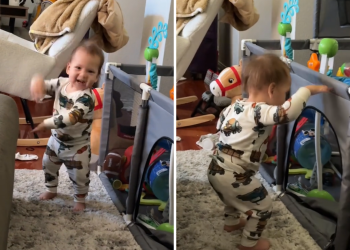President Joe Biden on Tuesday said he is bequeathing President-elect Donald Trump what he described as “the strongest economy in modern history” and “the envy of the world” while warning that efforts by the next administration to roll back his economic policies would result in great harm to Americans’ pocketbooks.
Speaking at the Brookings Institution think tank at what was billed as a major address on the economic legacy he is leaving behind after just a single four-year term, Biden recounted how he’d come into office with a “fundamentally different theory” from the “trickle-down” beliefs that have dominated economic policy since the rise of Ronald Reagan and modern conservatism in the 1980s.
Using a playbook of working to grow the U.S. economy “from the middle out and the bottom up, not the top down,” Biden explained how he’d pushed Congress to enact the American Rescue Plan Act shortly after he took office, along with the bipartisan infrastructure law he signed, the CHIPS and Science Act and the Inflation Reduction Act clean energy and climate spending package that capped his first two years in the White House.
Those record investments, he said, have resulted in a record number of applications to start new small businesses, record-low unemployment and a “soft landing” for the economy that has seen inflation retreat to pre-pandemic levels at or below two percent.
“In four short years, we’ve come a long way … from the crisis we inherited. We not only beat the pandemic, we broke from the economic orthodoxy that’s failed this nation, in my view, for a long time, a theory that led to fewer jobs, less economic growth and bigger deficits,” Biden said.
“My theory was the strongest economy is built from the bottom up, and the middle out … the best way to build in America was to invest in America. Invest in American products, invest in American people, not by handing out tax breaks of those at the top.”
Biden added that in his view, it had been “long past time for America to make a generational investment in our infrastructure and our manufacturing base, the technological edge in our clean energy future,” though he acknowledged that many Americans have had trouble seeing the value in what he did because of their own economic difficulties
“But I believe was the right thing to do, not only to lift America out of economic crisis caused by a pandemic, but set America on a stronger course for the future. And we did that,” he said.
Yet at the same time, the 46th president offered a warning to the 47th, who ran for and won the presidency for a second non-consecutive term — the first to do so in more than a century — by promising to institute high tariffs that most economists say would supercharge inflation once more and cripple the economy Biden is leaving behind.
“By all accounts, the incoming administration is determined to return the country to trickle down economics and another tax cut for the very wealthy that will not be paid for, or if paid for, is going to have a real cost,” said Biden, who cautioned that such a course would result in “massive deficits or significant cuts in basic programs of healthcare, education, veterans benefits.”
Trump, he continued, “appears determined to impose steep, universal tariffs on all imported goods brought to this country on the mistaken belief that foreign countries will bear the cost of those tariffs, rather than the American consumer.”
“I believe this approach is a major mistake,” he said.
Quoting the late Republcan president Ronald Reagan (who in turn was quoting founding father and 2nd president John Adams), Biden said he agreed with Reagan’s statement that “facts are stubborn things” and offered “a set of benchmarks” to measure Trump’s actions against those of the last four years.
He asked: “During my presidency, we created 60 million new jobs in America. Will the next president create jobs? Or like Herbert Hoover being the only president to lose jobs in his administration? During my presidency, we see the lowest average unemployment rate of the administration in 50 years. Will the unemployment be higher or lower in the next four years?”
Turning to inflation, Biden noted how his administration had brought inflation down despite “worldwide effects of the pandemic, Putin’s war in Ukraine and supply chain disruptions,” and was leaving it near two percent for Trump.
“Where will inflation be at the end of the next president’s term? These are simple, well established economic benchmarks used to measure the strength of any economy, the success or failure of any president’s four years in office. They’re not political, rhetorical opinions. They’re just facts, simple facts, as President Reagan called them, stubborn facts,” he said.
As he closed his remarks, Biden said he hoped it would be difficult for Trump to undo much of the infrastructure and economic investments his administration has put forth because much of it is meant to benefit places with strong support for Trump’s Republican Party.
“I knew people would be angry, but the reason the red states and they needed more because of the decisions they made …and geography,” he said.
He asked: “Will next president stop a new electric battery factory in Liberty, North Carolina that will create thousands of jobs? Will he shut down a new solar factory being built in Carterville, Georgia? They’re going to do that? Will he deny seniors living in red states $35 a month insulin?”
“I believe the only way for presidents to lead America was to lead all of America. And I believe the economy I’m leaving at the moment — and others could do better than I did, I’m not saying it was perfect — is the best economy, strongest economy in the world, and for all Americans, doing better,” he said.




















